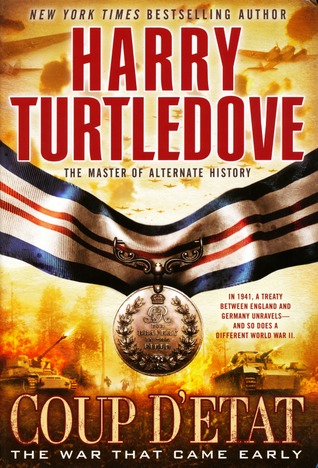 Coup d’Etat
Coup d’Etat
Author: Harry Turtledove
Publisher: Ballantine Books
ISBN-10: 0-345-52465-9
ISBN-13: 978-0-345-52465-2
Harry Turtledove is “The Master of Alternative History”, proclaims the cover of this book. The title page says: The War That Came Early: Coup d’Etat.
The list of “Books By Harry Turtledove” includes four other multivolume alternate history series, although three of these are arguably one ten-volume novel about a successful Confederate States of America that won the Civil War, and how this would affect world history for the next seventy-five years. (Turtledove has also written many non-alternate history fantasies.)
The premise of “The War That Came Early” is that World War II started in September 1938 following the failure of the Munich Conference. (Actually, Turtledove’s alternate history starts in 1936, when General José Sanjurjo returned to Spain to lead the Nationalists in the Spanish Civil War. In real history, Sanjurjo was killed when his airplane crashed, and General Francisco Franco ended up leading the Nationalists.) In Turtledove’s alternate history, the start of World War II in September 1938 leads to Germany and Italy withdrawing their military aid to the Nationalists to fight in the bigger war, with the result that the Spanish Civil War is still going on in 1941.
Coup d’Etat is the fourth volume of The War That Came Early. The publisher lists it as the fourth novel in a series, but I say that it is the fourth volume of a single novel, because none of the volumes have any resolution. They describe World War II during 1938, 1939, 1940, and 1941, with no end in sight. Turtledove postulates that none of the combatants were as ready for war in September 1938 as they were in September 1939, with the result that the fighting is more hesitant and drawn-out than it was in reality.
Turtledove tells the story in his usual style, through multiple “common man” viewpoints throughout the conflict. Everyone is battered by 1941. There are U.S. Marine Pete McGill, on one of the last U.S. ships to leave Manila for Hawaii to begin the reconquest of the Pacific (in the previous volumes, Japan has attacked the USSR and invaded the Pacific early); Peggy Druce in Philadelphia, who was vacationing in Czechoslovakia in 1938 when Hitler invaded, took two years to get back to America, and since then has been campaigning against isolationism and for preparedness; Sarah Goldman, a young Jewess living with her family in Germany under the not-quite-deadly Nazi regime; Theo Hossbach, a Wehrmacht non-com serving in a Panzer II tank crew in the USSR; Alistair Walsh, a British army veteran who has resigned from the military in disgust following the death of Winston Churchill and the new British government’s alliance with Hitler against Stalin; Hans-Ulrich Rudel, a Luftwaffe pilot flying against the Red Air Force; Ivan Kuchkov, Rudel’s counterpart in the Red Air Force who has just been shot down and is drafted into the Red Army; Vlacav Jezek, a Czech soldier who escaped after the fall of Czechoslovakia and is now fighting in Spain for the Republicans against the Nationalists; Luc Harcourt, a French non-com fighting in Russia as an ally of Germany; and several others in the German, Soviet, Japanese, and Spanish Republican military. All are low-ranking personnel or civilians, weary after three years of fighting, who fatalistically follow the new orders of their political and military leaders.
Since the title of this book is Coup d’Etat, and the previous volume established how unpopular the British government’s alliance with Hitler was, it is not much of a spoiler to reveal that the coup d’etat is in England and that the new government returns to fighting against Germany in alliance with the USSR. Aside from that, there are no surprises here. Germany and the USSR are still in a military stalemate; Spain is still divided between the warring Republicans and Nationalists; America is now at war with Imperial Japan in the Pacific but is still neutral towards Germany; and the Japanese viewpoint is that of another non-com, Hideki Fujita, who gets transferred from Manchukuo to Burma but never sees a larger picture of Japan’s goals. Like volumes two and three, Coup d’Etat begins in the midst of the story with no synopsis, and breaks off abruptly rather than coming to an end.
Coup d’Etat is fascinating for its plausible guesswork as to what starting World War II a year early would have meant in global political history. By focusing on “the little man”, Turtledove makes the point that no matter how the leaders may plan, it all comes to unavoidable warfare and misery for the masses. Readers who are interested in The War That Came Early are warned to start this series from the beginning: Hitler’s War, West and East, and The Big Switch before reading Coup d’Etat. This latest volume makes no sense by itself, and is obviously not the final volume in the saga.





